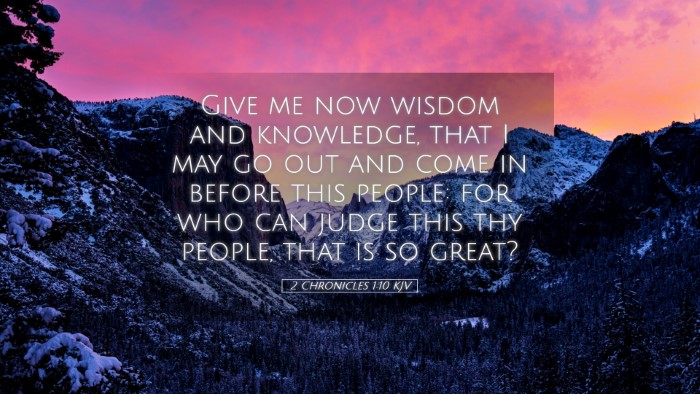Commentary on 2 Chronicles 1:10
Text: “Give me now wisdom and knowledge, that I may go out and come in before this people: for who can judge this thy people, that is so great?”
Context and Background
This verse occurs during the early reign of Solomon, following his ascension to the throne of Israel. Recognized for his deep desire to lead his people righteously, Solomon offers a profound insight into his character and priorities. The request for wisdom and knowledge highlights a biblical theme emphasizing the importance of divine guidance in leadership.
Theological Insights
In this passage, Solomon's request for wisdom signifies not only his understanding of the gravity of his responsibilities but also his recognition of the limitations of human insight. This evokes a larger theological discussion regarding the nature of wisdom as a gift from God, a recurring motif throughout the Scriptures.
Wisdom as a Divine Gift
Matthew Henry elaborates on the idea that Solomon’s prayer is a model for individuals in authority. He notes, “Wisdom and knowledge are not innate; they must be sought from God.” Here, we observe that the source of all wisdom is identified as divine, reinforcing the Scriptural principle that acknowledges human fallibility and the need for consultation with the divine.
The Role of Knowledge
Albert Barnes adds that the request for knowledge accompanies wisdom, emphasizing that these two attributes are inherently linked in the pursuit of effective leadership. Knowledge serves as a foundation upon which wisdom builds, allowing leaders to discern God’s will and execute their responsibilities effectively.
Practical Applications for Leadership
Solomon's example challenges modern leaders—be they pastors, managers, or educators—to prioritize their spiritual needs above material possessions. His advocacy for wisdom presents a pertinent lesson: to lead wisely requires humility and a sincere acknowledgement of one's own limitations.
Leadership and Dependency on God
This passage emphasizes the necessity for leaders to depend on God for insight and discernment. Adam Clarke underscores that real competence arises from spiritual alertness and responsiveness to divine guidance. Sampson-hindered decisions can lead to disastrous consequences, which makes Solomon's earnest plea particularly significant.
The Impact on the Community
Furthermore, Solomon's request underscores a core aspect of servant leadership: the needs of the community. Solomon asks for wisdom 'to go out and come in'—a phrase denoting daily responsibilities and engagements. This illustrates to modern leaders the importance of being attuned to their constituents' needs, as effective leadership directly influences the well-being of the community.
The Essence of Judgement
At the culminating point of his appeal, Solomon poignantly acknowledges the greatness of the people he is to govern, reflecting an understanding of the gravity of ‘judging’ such a significant populace. Matthew Henry points out that this modesty in recognizing the greatness of the task reflects true wisdom.
Recognizing Human Limitations
Clearly, Solomon viewed the task of leadership as a serious responsibility that warranted divine assistance. The verse reiterates a core biblical principle: acknowledging one's limitations is the starting point toward receiving God’s wisdom. Albert Barnes suggests, “Only the wise may account for the greatness of the people and the complexity of their needs.” Thus, true judgment is a blend of humility and reliance on God’s wisdom.
Spiritual Significance
This verse transcends its historical and cultural context, providing a spiritual framework for all believers. The quest for wisdom and knowledge illustrates a foundational plea in Christian life: seeking divine insight above all else.
A Model for Prayer
In terms of personal application, Solomon's request serves as a model for prayer—a deep yearning for wisdom that goes to the core of spiritual integrity. Both Adam Clarke and Matthew Henry agree that the nature of our prayers should reflect an understanding of our dependence on God to navigate life’s complexities.
Conclusion
In summary, 2 Chronicles 1:10 encapsulates critical themes around leadership, humility, and the pursuit of divine wisdom. For pastors, students, theologians, and scholars, the passage serves as a rich source for reflection on guiding principles that govern not just leadership but also personal spiritual journeys.


